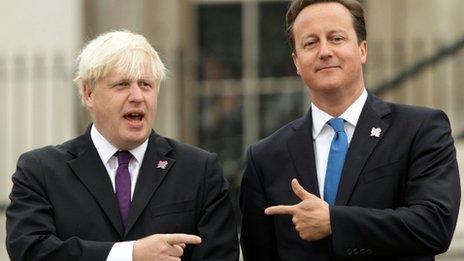Profile: Boris Johnson
- Published
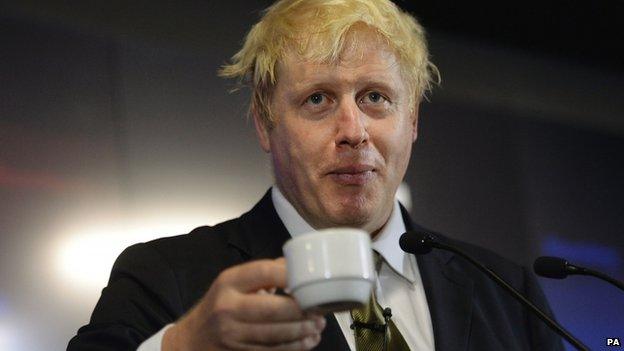
Boris Johnson's decision to "have a crack" at returning to Westminster next year will delight those who enjoy a bit of colour in their politics.
The 50-year-old London mayor has spent more than a decade combining the gravitas of his various roles with an unkempt, humorous persona rarely seen in modern public life.
David Cameron has expressed his delight at Mr Johnson's announcement, saying: "I want my star players on the pitch."
But the big question is whether the blond-haired old Etonian wants simply to play for the team or captain it.
He has arguably the highest profile of any Conservative except Mr Cameron and is held by many to harbour an ambition to be prime minister.
When he beat Labour's Ken Livingstone to become London mayor in 2008 it was the Tories' first high-profile election success since before Tony Blair's triumphant entry into Downing Street in 1997. He defeated Mr Livingstone again in 2012, giving him even more of a winner's aura.
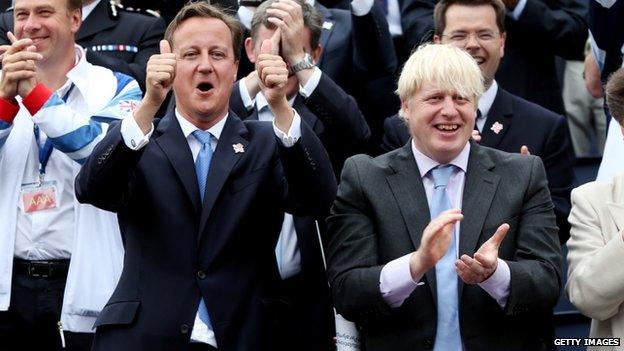
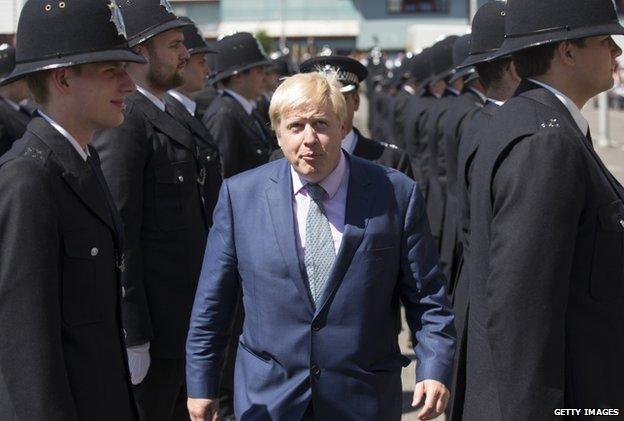
But, although lauded by Conservative activists for his witty speeches, Euroscepticism and lack of PR polish, Mr Johnson's political life has not been blemish-free.
In 2004 he had to make a visit to Liverpool to apologise for an article in the Spectator which he then edited. It had criticised the people of the city for their reaction to the death of Ken Bigley, the British contractor taken hostage and killed in Iraq.
The following month he was sacked by Conservative leader Michael Howard for failing to tell the party the truth about claims he had an affair.
He created media hysteria at the 2006 Conservative Party conference when he attacked healthy eating advice advocated by the chef Jamie Oliver. He said he would like to "get rid of [him] and tell people to eat what they like".
Later he provoked anger by describing Portsmouth as "too full of drugs, obesity, underachievement and Labour MPs" and associating Papua New Guinea "with orgies of cannibalism and chief-killing".
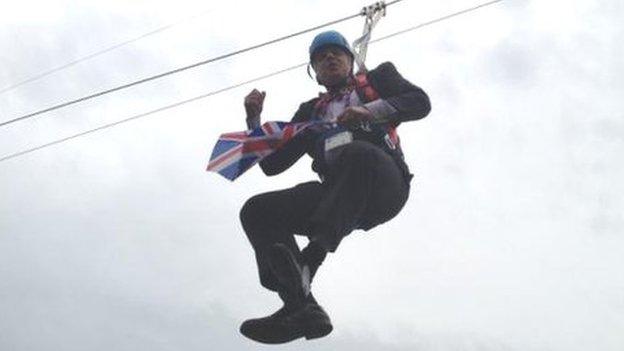
The London mayor's life has been as exotic as his use of language.
Alexander Boris de Pfeffel Johnson was born in New York and he held US citizenship until 2006. Descended from Turkish, French and German stock he describes himself as a "one-man melting pot". His great-grandfather, Ali Kemal, briefly served as an interior minister in the Ottoman Empire.
The son of a diplomat and Conservative Member of the European Parliament, he was educated at Eton College, where he was senior to David Cameron. There is said to be a sense of resentment on Mr Johnson's part at being usurped by his younger rival.
At Oxford University Mr Johnson, who flirted briefly with the centre left Social Democratic Party, was President of the Union. After only a week as a trainee management consultant he moved to journalism. Fired from the Times for making up a quote, he then worked for the Wolverhampton Express and Star before joining the Daily Telegraph, working as its Brussels correspondent and assistant editor.
In his seven years as MP for the ultra-safe Conservative seat of Henley from 2001 he did not make the shadow cabinet, becoming a party vice-chairman and holding roles as a junior spokesman on education and culture.
His decision to run for London mayor in 2008 added excitement to the contest. However, during the campaign he made a conscious effort to avoid any accusations of eccentricity. Most Londoners seemed to approve, as he beat Mr Livingstone by 54% to 47%.
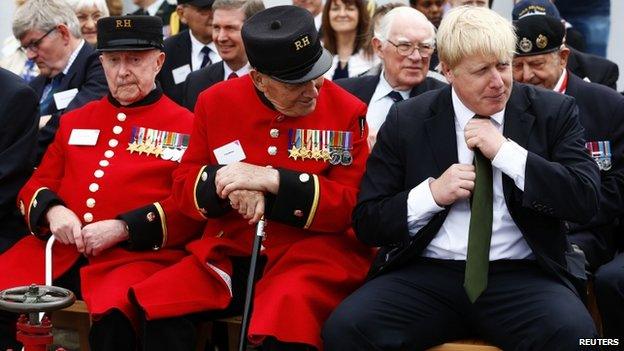
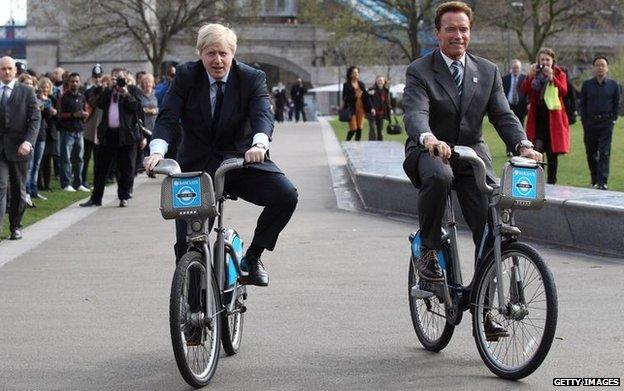
Days after his victory he banned alcohol consumption on public transport. A keen cyclist himself, he launched a central London bicycle hire scheme, now known as "Boris bikes", and ditched the "bendy bus" in favour of a new generation of double-deckers.
Although suffering a series of high-profile resignations from City Hall, it was Sir Ian Blair's departure as the Metropolitan Police Commissioner which attracted most controversy. Sir Ian said he was stepping down because of a lack of support from Mr Johnson.
He was in charge when riots hit the capital in the summer of 2011. Initially criticised for taking too long to return from a holiday, he was later praised for his handling of events, including making tours of the affected areas.
On the brighter side, Mr Johnson represented the city for its greatest showcase in decades - the 2012 Olympics. His speeches were well received but he was a little embarrassed when, at one event, he got caught on a zipwire, to the delight of photographers.
In 2011 he told the BBC's Newsnight he did not expect to do "another big job in politics" after leaving the mayoralty. This was not universally accepted at face value.
Mr Johnson has arguably fuelled speculation about his ambitions by continuing to make speeches touching on issues beyond his remit in London, in particular on Europe - a touchy subject between Mr Cameron and Conservative MPs.
Mr Johnson's second term as mayor is due to end in 2016 - a year after the next general election. The possibility of combining this role with being an MP was effectively given the go-ahead by Mr Cameron earlier this year, saying he wanted him "on my team".
Mr Johnson has now acted on this prompt, admitting that he could not "endlessly go on dodging these questions" about his future.
A return to Parliament would be likely to come with a frontbench role for the Conservatives. If the party stays in government, this will probably mean a ministerial - even a cabinet - role.
A major player would be back on Team Cameron, but the questions about his ultimate intentions are unlikely to fade.
- Published6 August 2014
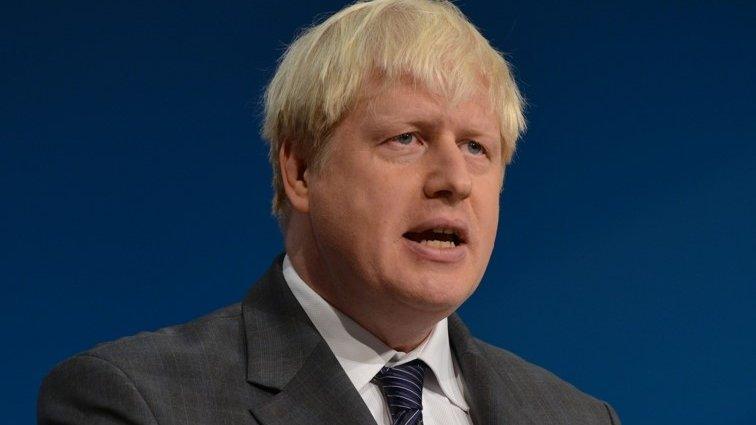
- Published6 August 2014
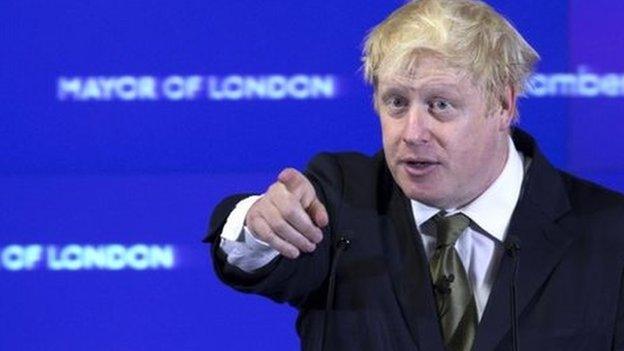
- Published21 March 2014
